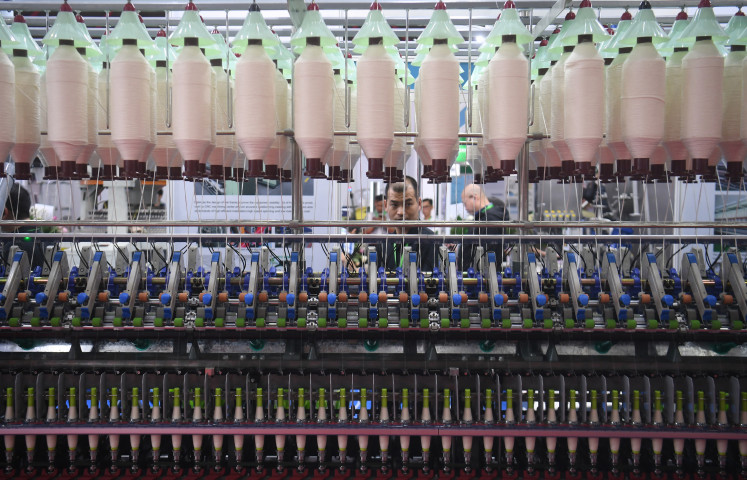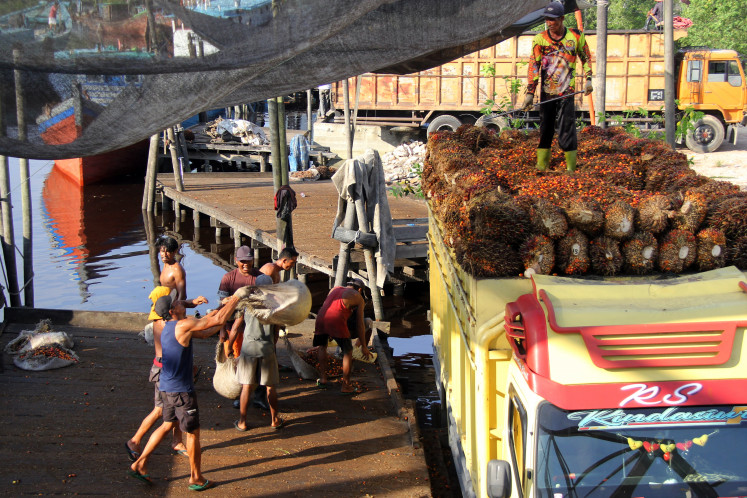Popular Reads
Top Results
Can't find what you're looking for?
View all search resultsPopular Reads
Top Results
Can't find what you're looking for?
View all search resultsBatik lovers are spoilt for colorful choice
Batik has become stylish wear in recent years, and is no longer pulled out of the closet only for a wedding or formal ceremony
Change text size
Gift Premium Articles
to Anyone
B
atik has become stylish wear in recent years, and is no longer pulled out of the closet only for a wedding or formal ceremony. Although Friday is the day when people wear their traditional fabric as a sign of national pride, the fashionable cuts and designs – and their wide availability at stores and malls – make batik wearable on any day of the week.
Grathia Pitaloka likes to take her pick from the wide variety of stores in Jakarta, with favorites including Sarinah Department Store, Level One at Grand Indonesia and Batik Keris.
Tia’s collection, now numbering 25 pieces, includes tops, skirts and dresses. “I never set out to collect batik but I buy them because their cuttings are simple but cute and they are comfortable to wear. They match my jeans and pants,” she said.
For many Jakartans, Thamrin City shopping center and Pasaraya are not the only places in town to look for batik. Sarinah, with several floors devoted to traditional fabrics and handicrafts, is also an outstanding place to
find what they are looking for. “They have plenty of choices from many local designers,” said one shopper recently.
Melisa Kusmarina, who works in finance in Jakarta, has loved wearing batik since her university days. She chooses the Danar Hadi brand because its shops offer classic batik bearing rare motifs.
“I shop there especially when I need a classic batik for a wedding reception,” she said, adding that she trusts the brand’s quality.
“The cloths permit me to create any sort of fashionable dress or clothes I like. I sometimes find that ready-to-wear batik does not fit my style anymore.”
Still, she sometimes opts for ready-to-wear batik, and names Ambassador Mall in Kuningan, South Jakarta, for its variety and affordability.
“Prices are quite low and some styles suit me well. I can say they are relatively fashionable,” she said, disclosing that she allocates between Rp 100,000 (US$11) and Rp 300,000 for a one-day excursion to the mall.
Melisa likes simple motif and natural colors, such as brown. She is enchanted by the lively motifs of the earth-toned batik from Madura Island in East Java because they help enhance her mood.
“I wear them for special occasions because I don’t like monotony,” she said.
Bali also offers rare finds, and she can spend up to Rp 500,000 in a day of batik shopping.
“I find beautifully cut pieces there. In 2006, I bought an asymmetrical cut batik skirt and I still like it.”
Batik aficionados are not confined to women.
“I have to keep checking the spending habits of my husband or else he will keep splurging on brand-name batik,” says housewife “Jenny”.
“I think he likes it because it’s formal for any occasion but also now stylish enough to look good,” she says. “Buying batik has become his guilty pleasure.”
If you are on vacation in Central Java, the place where batik originated, then good bets for batik shopping are Pasar Klewer and the villages of Laweyan and Kauman in Surakarta (Solo), while in Yogykarta there are notable outlets along Jl. Malioboro, Pasar Beringhardjo market and Mirota Batik.
Laweyan and Kauman are home to many batik shops, with Laweyan reputedly the oldest batik village in the country. Its old-town feel remains in its architecture blending design elements from Java, Europe, China and the Middle East.
Kauman is famed for its fabric made of natural and woven silks, which is produced in hand-crafted batik, printed batik and a mix of the two forms.
Bargain hunters should visit Pasar Klewer, which offers a vast array of choices, as well as one of the best places to pick up traditional Central Javanese striped lurik fabric.
When in Yogyakarta, Tia also indulges her yen for batik at the Mirota store.
“I stick to the place when it comes to buying batik because it offers lower prices and much better quality than batik sold by street vendors.”
For those seeking a more leisurely shopping experience, and one where they can also stop to enjoy tasty traditional snacks, then a visit to Pasar Beringhardjo is advised. The market, built in 1758, offers batik cloth and attire made from cotton and silk. Prices run the gamut, from a few thousand rupiah to the equivalent of buying an international brand-name gown.
For confirmed lovers of batik, it’s not the price that matters, but finding the piece of fabric that they want.










